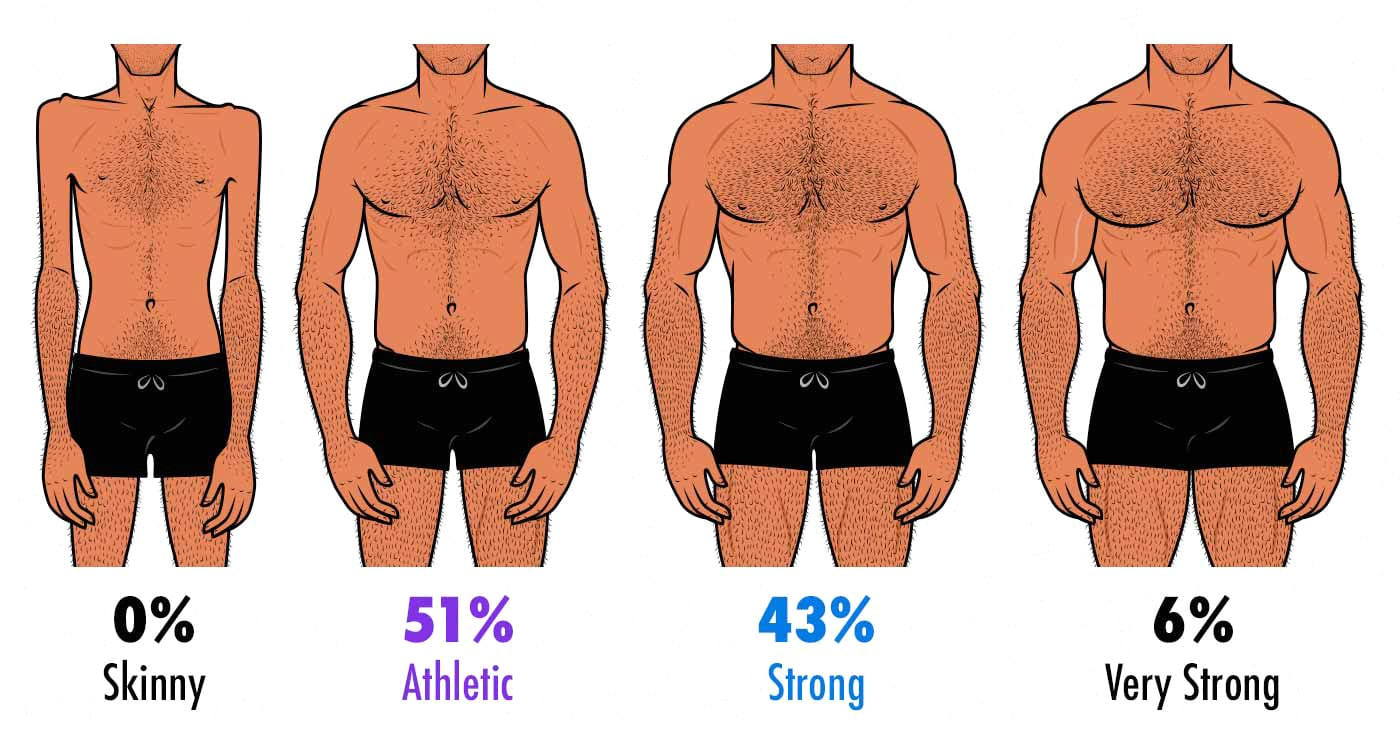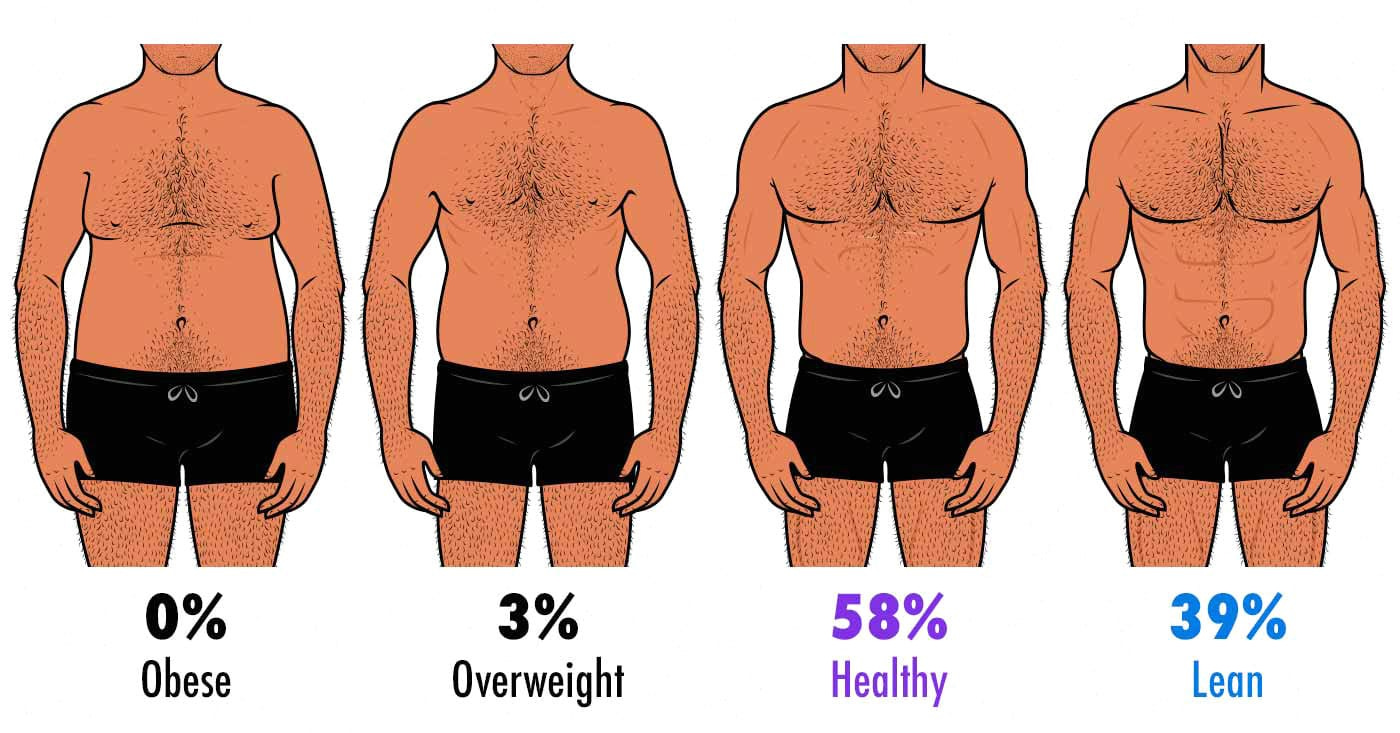Women don't like bodybuilder physique
So they say at least
William Costello spawned discussion at X over his polling results:
The same man before and after going hard in the gym. Women preferred the before picture and men the after picture. Thus, it seems men overestimate how much women like muscles, insofar as we accept their survey responses.
But maybe women on Twitter/X are weird, and we should ask some other women. Fortunately, a lot of fitness and dating interested men have already done such surveys. Shane Duquette ran a bunch of surveys in 2011 and got these results:
Gym bros tend to aim (hope) for the last picture, but women prefer the Fight Club-like left picture by a large margin.
In particular, women do not like male bodies who look like they are about to stave to death. Evolutionary, this makes good sense, even if today skinniness is a high intelligence and class thing, not a low g/class thing.
Importantly, extremely visible stomach muscles require a very low body fat %, so men gym bros aim to lower this value using various dieting and training patterns. Survey results suggest this is a waste of time and effort, as women prefer having more fat on the body.
The results are not due to the particular men picked, or their tattoo variation. In this comparison of old photos, they prefer the swimmer look to the others, and the bodybuilder comes in last, even behind the regular guy.
The results are not dependent on using real male photos either, as similar results were obtained using drawn figures in a later survey.
This is not to say that women prefer fat men either:
But what about external validity? Maybe women don't know what they want, and we should look at something more concrete, like fertility. Fertility of men can be affected by many factors, of course, but surely female choice has something to do with it too (sexual selection). As such, we should expect to see some effect of muscles and body weight on male fertility. In fact, what we would ideally like is a study of men's bodies in their adult lives (say, 20-40) and their eventual number of children. Then we could see how variation affects their actual lifetime (completed) fertility. I couldn't find such a study, but there's a study of Finnish adolescents BMIs and their lifetime fertility.
This isn't ideal, but does show that BMI at least has a nonlinear relationship to fertility, in both men and women. In evolutionary terms, there is stabilizing (variance reducing) selection for BMI in humans. Optimal BMI for men is a bit higher than for women, judging from the figure. Bodybuilders have very high BMI (but aren't fat, the proxy fails). So insofar as we could unwisely generalize from these results, bodybuilder fertility would be expected to be somewhat lower. To note, this study is not good, as they used squared terms to model nonlinearity, which assumes a specific shape of the function (symmetric). Furthermore, these squared terms were only borderline p < .05, so we really can't make much of these results. I include the study here because it is the only study I could find with curves like these, which are in the right direction of the study I want.
Alternatively, we can look at the associations between masculinity traits, strength included, and male fertility. There is a meta-analysis of these:
Humans are sexually dimorphic: men and women differ in body build and composition, craniofacial structure, and voice pitch, likely mediated in part by developmental testosterone. Sexual selection hypotheses posit that, ancestrally, more ‘masculine’ men may have acquired more mates and/or sired more viable offspring. Thus far, however, evidence for either association is unclear. Here, we meta-analyze the relationships between six masculine traits and mating/reproductive outcomes (96 studies, 474 effects, N = 177,044). Voice pitch, height, and testosterone all predicted mating; however, strength/muscularity was the strongest and only consistent predictor of both mating and reproduction. Facial masculinity and digit ratios did not significantly predict either. There was no clear evidence for any effects of masculinity on offspring viability. Our findings support arguments that strength/muscularity may be sexually selected in humans, but cast doubt regarding selection for other forms of masculinity and highlight the need to increase tests of evolutionary hypotheses outside of industrialized populations.
So at the very least, we know that more masculine men have more children, but this study can't tell us about nonlinear patterns. However, the authors note:
A limitation of our analysis is that we only assessed linear relationships, ignoring possible curvilinear associations. There is evidence suggesting that moderate levels of masculinity might be associated with increased reproductive success (see e.g. Boothroyd et al., 2017, for offspring survival rates) and perceived attractiveness (Frederick and Haselton, 2007; Johnston et al., 2001, but see also Sell et al., 2017), with a decrease for both very low and very high levels of masculinity. Indeed, some of these authors have argued that masculinity may be under stabilizing, rather than directional, selection in humans. In instances such as these, our ‘null’ conclusions regarding e.g. facial masculinity, remain valid; facial masculinity does not appear to be under directional selection. However, we also note that there is data suggesting that height in men may be optimal when it is over-average but not maximal. In this scenario, although the linear relationship would be weaker, the trait remains under directional selection, and we would still expect to see positive, albeit weak, associations in our analyses. In the vast majority of studies included, only linear relationships were tested, and acquiring original data to investigate and synthesize non-linear effects was beyond the scope of the current article. However, increased publication of open data with articles may well facilitate such a project in future years.
This is in line with the results from surveys of women.
Assuming the central claim is true, why must bodybuilders be undesirable to women? It is not necessarily because they aren't strictly speaking physically attractive, but that bodybuilders have other personality traits women don't like. Mate choice is a package deal, so even if women prefer men as strong as possible, women also prefer men who spend their time on them and their families instead of going to the gym 20 hours a week. After all, lifting weights costs money (gym membership, equipment, and especially opportunity cost) and produces only a temporary gain in muscle, so there are clearly diminishing returns to this behavior and it probably turns negative. If a man spends 50 hours in a gym/week, he has no time to make money in a job. Perhaps a better way to ask, then, would be to ask women how many hours they prefer men spend a week on fitness activities, assuming they are not professional athletes. I couldn't find a study of this either, but I guess I could do a quick survey.








Scientifically speaking, you can't compare those pictures, because "body type" is not the only variable there. And some of those other variables are more important for attraction than body type.
Trusting what women say they like is a trap lol Women's assessments of men (and all things) are highly ... idk holistic? For anyone who knows anything about women it's obvious they say they prefer the "before" picture because in the "after" picture the guy looks kind of douchey and tryhard. Women are giving their opinion on the whole picture not the body. Same with 58% liking the skinny guy with tattoos - the other pictures have no tattoos. And Brad Pitt is in a power pose in his famous body shot - the fact he is in this perfect thirst trap position is the whole reason this picture has been viral on the internet for decades now.
Apples and oranges...
They should really have a t-shirt on for the photos they show in these polls instead of being bare-chested since that is how women are most likely to see and judge a man's physique.